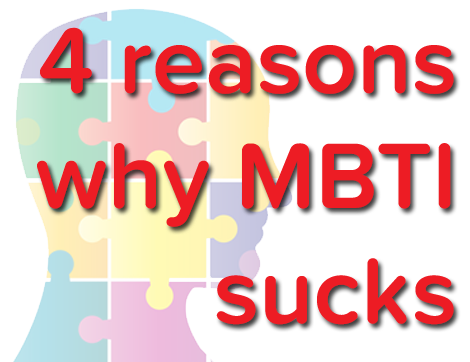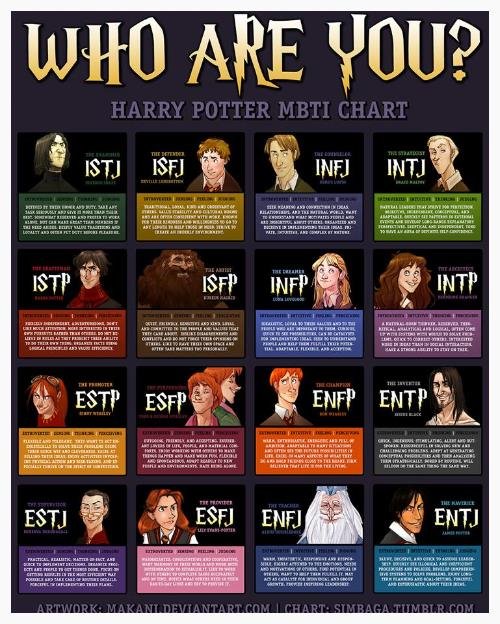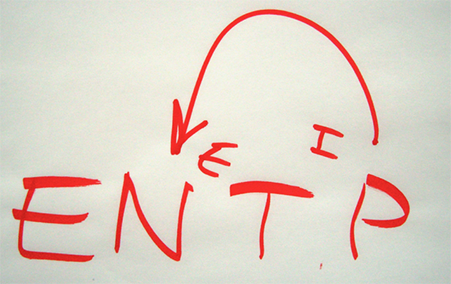4 Reasons Why MBTI Sucks
MBTI is a popular test and theory used in a number of online "personality tests". However, what is its true value and is it worth to identify oneself with four letters that supposedly define our personality?

In 1942, Katharine Cook Briggs and her daughter Isabel Briggs Myers created their own personality questionnaire based on Carl Gustav Jung's theory of psychological types. Katharine Briggs, even before the Swiss psychiatrist published "Psychological Types", studied the biography of people, trying to grasp differences in the existing temperaments. Having familiarized herself with Jung's theory she noticed many similarities to her findings, but decided that Jung's typology was much more profound and decided to create her new tool based on "Psychological Types".
The indicator's result categorizes the recipient into one of the 16 resulting types, which are coded by the letters of each of the psychological functions the type is supposed to consist of, for example INTP (Introverted, iNtuitive, Thinking, Perceiving) or ESFJ (Extraverted, Sensing, Feeling, Judging). Myers-Briggs Type Indicator is an instrument used in many fields such as education, counselling, coaching, psychotherapy for couples or families and team building, as well as in scientific research published primarily in the Journal of Psychological Type. It is now the most widely used personal inventory in the United States.
Here are 4 main reasons why you should NOT use this inventory:
1. MBTI misinterprets Jung's theory
Theory of MBTI understand Jung's psychological types as categories of traits in a way that comprehensively explains the complexity and diversity of human personality traits. In fact, Jung described the types as types of consciousness that are possible to experience by all people. Another suitable term is cognitive modes. A person who experiences the most frequently a consciousness of an introverted-sensitive type does not have to always be in this state. This only means that such consciousness prefers and most often experiences it.
Thus, a psychological type in Jung's original understanding means no less than the preferred cognitive mode - so these are not "character" traits constantly assigned to a person, as suggested by the creators of MBTI. Thus, Jung's theory does not try to describe and categorize kinds of personalities at all! - contrary to what MBTI is trying to do. In addition, the test is not designed in such a way that each of the functions listed by Jung can be revealed in every question, which according to the Polish researcher Czesław Nosal is a necessary condition for properly operationalising (translating psychological types theory into a test form).
2. Poor psychometric properties
Psychometrics is a statistical science that deals with the theory of creating and applying psychological tests and checking their usefulness. The authors of the test did not have any formal education related to psychology, and they acquired psychometric knowledge on their own. It is probably because of this reason that MBTI's psychometric properties leave a lot to be desired - the inventory is characterized by low internal and external validity, which means that the test is poorly investigating what it intends to investigate and that its results are not very suitable for generalization at the level of whole populations. Moreover, MBTI is poorly trustworthy, which means that the results will often differ when we do it once again. Depending on the tests, up to 76% of the test subjects obtain a different result after 5 week retest. It is precisely because of poor psychometric properties that this test is not respected by specialists.
3. Overestimation of type significance
The questionnaire assigns each man to four letters, e. g. INFP, ESTJ or ISTP, and offers a rich description and characterisation of each type. The problem is that there is no evidence that people of a given type behave in the way their creators would like it to be. In addition, some types are sometimes used as an excuse or justification for certain unhealthy behaviours.
This typology was supposed to be valuable mainly for clinicians - Jung warned that people not familiar with psychology may not use it correctly. His fears were in fact prophetic. MBTI is commonly used on the internet as a way to categorize one's personality, which is completely opposite to the original assumptions of Jung. In 1932 he wrote this to Wolfgang Kranefeldt:
I have generally never occupied myself with the so-called character. My intentions and interests are also in no way directed to characterology, but in complete contrast, to typology. But not in the sense that I have established types in order to classify people with, but to have a schema with which I can order psychological material.
In another letter to Kranefeldt, he did not hide his irritation from the fact that his work wasn't understood, mentioning that his typology was supposed to be "an instrument for sorting empirical material", and not "a drawer to which individuals can be assigned without any questions".

Seriously?
image source
4. "Type dynamics"
Myers-Briggs Type Indicator has been expanded by an additional, fourth dimension in relation to the original theory - these are attitudes towards the outside world, which according to authors, Jung described in Psychological Types implicte. The differentiated pole is Judging-Perceiving. Judging describes the tendency to organise, plan, make decisions, decide and routinely express judgments, while the Observation describes features related to spontaneity, openness, forgiving and tolerant attitude, curiosity and the search for new experiences.
James Reynierse analysed statistically a sample of over 700 respondents and revealed numerous inaccuracies caused not so much by the introduction of the Judging-Perceiving (J-P) pole, but by its erroneous interpretation. MBTI assumes a dynamic relationship between functions - the J-P dimension is intended to determine which primary functions are extrovert, i.e. it defines the dominant and tertiary function in extroverts and the secondary and quaternary function in introverts. According to Jung, these two categories of attitudes are independent and should not be linked. The division used in the MBTI and the role of the J-P dimension in determining which functions are dominant does not, according to Reynierse, have any support in empirical evidence and create categorical and logical errors, which makes the inventory virtually worthless. Studies have shown that the descriptions and alleged effects of "dynamics of types" are not reflected in real behaviour of people.
Contrary to appearances, Jung's theory of psychological types makes a lot of sense nowadays (different entry topic), but MBTI has done a lot of harm to it. It has become a huge business with little value, and in my opinion, it's even detrimental. Despite its scientific discrediting, it is still very popular. However, some attempts of re-modelling MBTI to meet modern standards and better reflect the theory of Jung, exists but they are almost completely unused.
If you are really passionate about psychological functions, look at the source and grasp the "Psychological Types" of Carl Gustav Jung!
Literature
Boyle, G. (1995). Myers‐Briggs Type Indicator (MBTI): Some Psychometric Limitations. Australian Psychologist, 30(1), 71-74.
Nosal, C. (2001) W poszukiwaniu psychologii kompletnej–Clark Hull, Edward Tolman, Carl Jung. Przegląd Psychologiczny, 44(1), 45-55.
Nosal, C. (2002). Czas i typy psychologiczne–próba retrospekcji. W: Maurin, K.
Pittenger, D. (1993). Measuring the MBTI… and coming up short. Journal of Career Planning and Employment, 54(1), 48-52.
Reynierse, J. (2009). The case against type dynamics. Journal of Psychological Type, 69(1), 1-20.
Reynierse, J., Harker, J. (2008). Preference multidimensionality and the fallacy of type dynamics: Part 2 (Studies 4-6). Journal of Psychological Type, 68(11), 113-138.
Reynierse, J. (2012). Toward an empirically sound and radically revised type theory. Journal of Psychological Type, 72(1), 1-25.
Szwedo, J. Współczesne próby weryfikacji empirycznej i reinterpretacji wybranych konstruktów teoretycznych psychologii analitycznej.

Being A SteemStem Member
Thanks guuuys <3
DISCLAIMER: dropahead Curation Team does not necessarily share opinions expressed in this article, but find author's effort and/or contribution deserves better reward and visibility.
to maximize your curation rewards!
with SteemConnect
12.5SP, 25SP, 50SP, 100SP, 250SP, 500SP, 1000SP
Do the above and we'll have more STEEM POWER to give YOU bigger rewards next time!
News from dropahead: How to give back to the dropahead Project in 15 seconds or less
In HR we use these tests a lot. In my opinion it's a waste of time and money. I took all these tests just for fun and proved them i can lead the results to wherever i want to and have any personality i want. Your true personality will come when you start working, then and only then everyone will understand the true nature of a employee!
Why are you using it at work if you know it's worthless? :P Is it obligatory?
yes :P during that period of time i was doing my internship and image to completely stop using those test you have to take 4-5 layer approval :P in other 2-3 executives have to say to the chief of hr and he must say the same to the ceo :P
I agree, whole-heartedly. It amazes me how some people get into fights over this stuff.
Yeah and many people absolutely love that idea and theory even when you tell them (as a specialist) that it's wrong. Can't understand that.
Great to see such a good content here in steemit. Well, I agree. Jungian typology is complex and is a good tool in the hands of a professional, but, in other cases, it can be problematic. For example, it's common to see people doing online MBTI tests and proclaiming to the four winds: "Look at me! Look how special I am, I'm an INTJ!". A great way to justify, as you said, some undesired behaviours. Also, is obvious that a lot of people just select the more introverted answers (an extroverted problem according to Marie-Louise von Franz) in order to acquire some result. In university, I've done a test that was based on Jungian Typology, but I don't remember the name. The result was a bit curious for me. and since then I keep an eye open with those things.